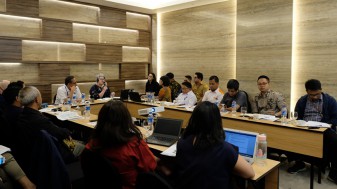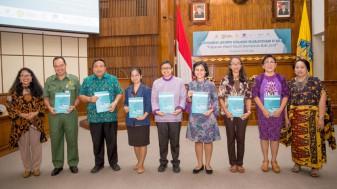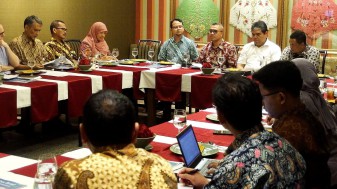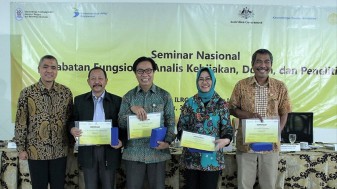Indonesian Center for Law and Policy Studies (Pusat Studi Hukum dan Kebijakan Indonesia, PSHK) is a research and advocacy institution for legal reform, founded in 1998 with a particular focus on legislation and the judiciary. PSHK’s vision is to realise the formation of socially responsible laws in Indonesia. In the field of legislation, PSHK’s three main activities include legislation monitoring, legislation performance and formulation of statutory laws. Meanwhile, in the judicial sector, PSHK has consistently been involved in the reform agenda at the Supreme Court of the Republic of Indonesia. PSHK’s research themes range from environmental issues, education and employment, to electronic commerce, with a focus on policy and institutional governance. PSHK continues to develop innovative approaches to regulatory reform in Indonesia.
Regulatory reform is among the focus issues of the second term of President Joko Widodo’s administration. In addition to stating this during the presidential candidate debate in January 2019, President Joko Widodo reaffirmed the focus on regulatory reform during his inauguration. PSHK sees this as an opportunity to put forward the issue of regulatory reform, which is important in promoting the sustainability of Indonesia’s development. For this reason, PSHK develops studies to advocate for regulatory reform with a more systematic approach, to oversee regulatory reform in the 2020–2024 Medium-Term National Development Plan (RPJMN), and seek to improve regulatory management by improving the competence of regulatory actors.
The Complexity of Regulatory Reform
PSHK’s findings with the Ministry of National Development Planning/National Development Planning Agency (Ministry of NDP/Bappenas) in the background study on Regulatory Reform for the Preparation of the 2020–2024 RPJMN inform that ‘hyper-regulation’ is not the sole issue in regulatory management in Indonesia. Apart from overregulation, there are a host of other problems such as poor synchronisation of development and regulatory planning, low compliance with provisions regarding content and hierarchy of laws, the absence of a regulatory monitoring and evaluation mechanism that is integrated with the legislation process, and the absence of a special regulatory management authority at the central level.
Through a series of policy research and advocacy activities, PSHK oversees regulatory reform in the 2020–2024 RPJMN. For the first time since RPJMN has served as the national development framework, regulatory reform has been placed in a dedicated section in the 2020–2024 RPJMN document. The document also lists a number of laws and regulations that need to be enacted within a period of 5 years. The list of regulations can serve as an initial tool for monitoring the implementation of the regulatory reform program in the executive domain, especially in ministry work units such as the National Legal Development Agency (BPHN) and the Directorate General of Statutory Laws (DJPP) at the Ministry of Law and Human Rights.
Even so, there are potential complications from the success of PSHK advocacy in overseeing regulatory reform in the 2020–2024 RPJMN. Regulatory restructuring through the establishment of an institution to manage regulations contained in the RPJMN signals the potential for a shift in approach to regulatory reform. The potential for these complications has become apparent with the issuance of Presidential Regulation Number 68 of 2021 concerning Granting Presidential Approval to Draft Ministerial Regulations/Heads of Institutions (hereinafter referred to as Perpres 68/2021). In this regulation, which takes effect on 6 August 2021, every draft regulation initiated by a ministry/institution must obtain prior approval from the president before it is enacted.
At a glance, the issuance of Perpres 68/2021 may seem like a solution to ‘hyper-regulation’ at the ministry/institutional level. In 2019 alone, PSHK identified 8,311 regulations at the ministry/institution level. This figure does not include the hundreds of new regulations issued until 2021. However, in the Indonesian context, PSHK feels the Presidential Regulation could add new complications to producing regulation. The many doors that must be passed through may result in further bottlenecks for regulations. PSHK found that the task of harmonisation, evaluation and analysis of executive regulatory product designs held by BPHN of the Ministry of Law and Human Rights itself has so far not succeeded in addressing the regulatory arrears as it is often impeded by the tug of war on regulatory planning authority.
Another problem that can be expected from this is increased presidential power. On the one hand, the assertion of a firm political command with this regulation is a positive step, but on the other, this much power could give broad discretion to the president, giving rise to the potential for considerations that are more political than in the public interest. In response to this situation, PSHK was the first institution to address the existence of Perpres 68/2021 and its relevance in the discourse on regulatory reform. In the public discussion held on 18 August 2021, regulatory experts identified the problems and benefits, as well as enlightening the public about the significance of Perpres 68/2021 on the quality of regulations and the sustainability of regulatory reform. Based on these findings, PSHK will provide recommendations to be followed up on by policymakers. PSHK also continues to monitor the implementation of the 2020–2024 RPJMN related to regulatory reform in government institutions, especially BPHN and DJPP at the Ministry of Law and Human Rights.
Improving Competency
The government has passed Law Number 15 of 2019 which amends Law Number 12 of 2011 concerning the Establishment of Legislation at the end of 2019. With this change, the mechanism for monitoring and evaluating regulations is now formally recognised in the process of forming laws and regulations. A more comprehensive amendment to Law 12/2011 needs to be continuously encouraged so that the government and the House of Representatives (DPR) have a strong legal basis for improving regulatory management. Efforts to improve regulatory management need to be supported by improving the competence of regulatory actors.
To that end, PSHK optimises the use of manuals for assessing laws and regulations in a training series on regulatory drafting and assessment. The main targets of this training are drafters and researchers at the Ministry of Law and Human Rights, the Ministry of Home Affairs (MoHA), Bappenas, the Regional Representatives Council (DPD) and other ministries/institutions relevant to the function of forming regulations. As the purpose of this program is to improve the quality of regulations produced by the government, other stakeholders such as civil society organisations and the private sector will also be the indirect beneficiaries of this improved regulatory process.
Knowledge Sector Initiative (KSI) Support
PSHK’s advocacy on strategic and complex issues such as regulatory reform is important in improving the quality of sustainable development in Indonesia. KSI’s support helps PSHK to carry out a continuous process of advocating for regulatory reform that involves a series of activities from research and issue monitoring to collaborating with key parties. KSI’s support is mainly in the form of a flexible funding scheme that enables PSHK to design and conduct its planned research and advocacy. Through program logic sessions and evaluation and monitoring support, KSI also helps PSHK to advocate for policies more systematically and encourages PSHK to integrate a reflective process in its work.






